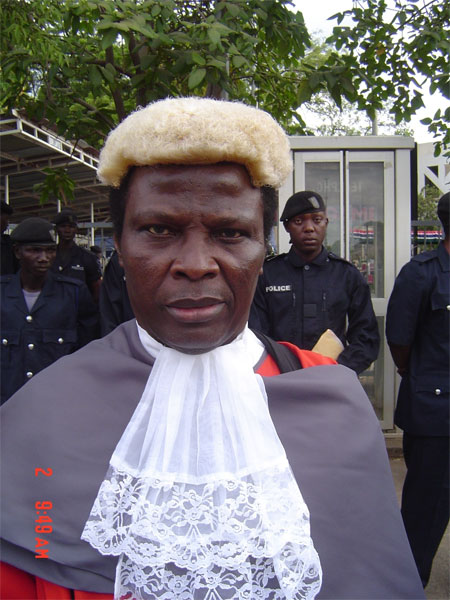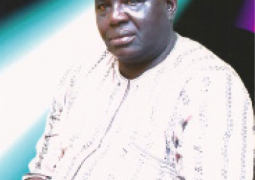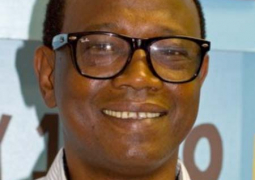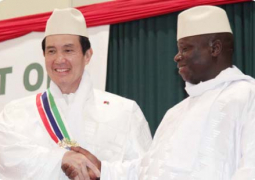All Protocols Duly Observed
It is
indeed a great honour for me to be invited by Her Ladyship the Hon Chief
Justice of Ghana to attend this momentous occasion.
I am very privileged too to address this august gathering. It is also my great
pleasure to visit this great country and have this rare opportunity to interact
with colleagues from different parts of the globe.
Mr. Chairman and Distinguished
participants
The
Government of the Gambia is fully committed and has been
working tirelessly to meet the targets set by the United Nations for the
achievement of the Millennium Development Goals (MDGs) that is, halving poverty
by the year 2015. The Government has designed and adopted a Poverty Reduction
Strategy Paper (PRSP II) as the vehicle to achieve the said MDGs in the Gambia. Two of the PRSP II policy objectives are (1) to
enhance access to, and the performance of, the Judiciary and (2) to mainstream
gender issues in the national effort. These objectives have become critical
factors in the Gambia's strategic development process.
On the
issue of mainstreaming gender, the Gambia has taken several positive,
practical steps to establish an appropriate platform for the promotion of
gender. The appointment of Gambian women to key posts in Government, at the
Judiciary and the National Assembly are clear pointers. Her Excellency the
Vice-President, the Hon Speaker of National Assembly, the Hon Attorney General,
the Secretary General and Head of Public Service, seven of the eleven Hon
Judges of the Superior Courts, the President of Gambia Bar Association, five
Hon Secretaries of State (Ministers) and several Permanent Secretaries (Heads
of Ministries) are all women. In the private sector, Gambian women have been
rising steadily. So have they been in the informal sector as well.
Mr. Chairman and Distinguished
participants
In
political, socio-economic and professional circles, the Gambian women have
continued to champion gender causes and have recorded considerable successes
and achievements. There are a range of PRSP strategies, activities in health,
education and agriculture that aim at enhancing access to (I) quality girls' education,
(2) appropriate health services for women and (2) adequate agricultural inputs,
including access to land, and (4) marketing options for the rural womenfolk. In
fisheries and other informal sectors, Government has plans and programmes that
are intended to empower the womenfolk. At the intellectual and governance
levels, advocacy groups and Non-Governmental Organizations have abounded and
are supporting gender promotion.
Mr. Chairman and Distinguished
participants
One such
advocacy group is the Female Lawyers Association of the Gambia (FLAG). Women form the majority of the
legal practitioners in the country. FLAG therefore comprises over seventy
per cent of the lawyers. In the Gambia, a great opportunity and platform
have been created in the Gambia for the promotion of gender and to
achieve the desired developmental goals. One very good example is The Women's
Bill. It has been the outcome of combined efforts of women stakeholder groups
in the country. When this Bill becomes law, gender promotion and women issues
would place at the center of all national development initiatives. The attempt
by the womenfolk has been quite bold yet necessary. It must be emphasized
Gender parity would never be fully realized if the women are not, as a matter
of law, empowered. Women empowerment has become the cornerstone of gender
promotion.
Mr. Chairman and Distinguished
participants
Gender
Justice Promotion in Africa as it relates to the Judiciary must be seen from within the
same policy context. The Judiciary has a social duty. It is a key, strategic
governance institution. It has a duty to respond adequately to the needs of the
country and to complement the development efforts of other institutions within
Government and the country at large. The policy goals and objectives of
Judiciary, which are in tandem with poverty programmes of Government, are to
enhance access to justice to the poor and the underprivileged. This includes
the women and children of the country. In line with this policy, new structures
have been put in place in the Judiciary to decentralize judicial services and
focus the administration of justice on thematic areas such as women and
children.
Mr. Chairman and Distinguished
participants
In this
regard, we have a Division in the High Court devoted to Family Matters. There
is also a Children's Court established in 2005 to deal specifically with
matters relating to and affecting children and young persons. These courts
handle substantial issues pertaining to and affecting the womenfolk. The country,
with a population of over 80 per cent Muslims, has three Muslim Courts dealing
with: Marriage, Divorce and Inheritance of Muslims. The bulk of these court
users are the urban women. The rural women appear before the District Tribunal,
the lowest court within the judicial structure. It is presided over by a
District Chief who is assisted by four to five village or community heads. In
the Cadi Courts and to a large extent the District Tribunal, women form the
majority of litigants. In these courts, however, there are always first
attempts at amicably settling disputes. We do have formal review and appeal
processes in place that serve as the checks and balances.
Mr.
Chairman and Distinguished participants
Notwithstanding,
problems do remain and exist. As the Chief Justice, I have been regularly
receiving a barrage of complaints from un represented women about how their
cases are treated in these courts (Cadi Courts and sometimes District
Tribunals). After a thorough examination of the problems posed in these
complaints, the challenges to the women have been cultural than rlegal or
judicial. It is my view that the issue of rights of women in Africa, sometimes, bothers on perception.
Therefore the battle in promoting Gender Justice in Africa must commence with perceptions.
There is a serious need for cultural changes to take place and this change must
engulf the whole fabric of society starting from the bottom. Indeed, we policy
makers and the professionals assisting us are quite au fait with the need to change.
Can we say the same for the main beneficiaries - the women? It is my strong
view that the womenfolk must change perception. There is need to educate and
orientate them. I am however very happy to state that in the Gambia, the policy in place is very close
to compulsory education for girls. This means that the war has been taken to
the primary schools. We look forward to a sustainable, long term solution.
Mr. Chairman and Distinguished
participants
I now turn
to Alternative Dispute Resolution (ADR). The backlog of court cases, caused by
in ordinate delays in processes and proceedings, has compelled the Gambia to embrace the formal ADR system.
Over the past five years, the World Bank had raised serious concerns about
delays in our courts. These were affec ting the economy and investment
opportunities. After consultations with stakeholders, the Bank, under the CapacityBuilding for Economic Management Project
(CBEMP), evolved the strategy to establish ADR in the Gambia. Mr. Justice Stephen Alan Brobbey
of Ghana was Chief Justice at the time. As a
complement to CBEMP initiative, the Department for International Development
(DflD) assisted the Judiciary to organize a series of sensitization seminars
for Judges, Magistrates and Senior Court officials on ADR. DflD later funded
a group of top judicial administrators, registrars and a public lawyer led by
former Chief Justice Brobbey to understudy ADR in Ghana. Much later, CBEMP funded the
former Chief Justice and a group of seventeen legal sector officials (judges,
magistrates, private and public legal officials and others) from the Gambia
(which included me) to undergo an intensive training of trainers' course on ADR
in the United States of America. This was followed, at CBEMP's expense, by the
training of over a hundred prospective ADR mediators, which was undertaken by
former Chief Justice Brobbey and Hon Mrs Justice Georgina T Wood (current Chief
Justice of Ghana). Further funded by CBEMP, Ghanaian Chief Justice Wood and
former Chief Justice Brobbey, together with international resource persons,
drew up ADR procedural guidelines for the Gambia.
Mr.
Chairman and Distinguished participants
Whilst the
Judiciary was implementing these ADR capacity building activities, the
Department of State for Justice and the Attorney General's Chambers, supported
by CBEMP, were also vigorously pushing the ADR Bill which later became law -
the ADR Act.
The current
administration, under our stewardship, has been pursuing ADR in line with the
policy goals. We have established a Court annexed ADR system:
An ADR administrative structure was put in
place in the High Court
A registry, with staff approved by the
National Assembly plus equipment, furniture and staff training was put in place
with the assistance of CBEMP.
ADR Registry has been covering the High Court
and Kanifing Magistrate Court for the time being.
Funding was obtained from the National
Assembly for ADR management costs and fees for mediators.
As a
result, we have been able to facilitate the successful mediation of few cases
under the court annexed ADR system.
Mr.
Chairman and Distinguished participants
The ADR
system indeed has strengths (staffing, funding, among others). However, it does
also have weaknesses and serious challenges. These includes
1. The
legal challenge: Opting for ADR under the law is optional. Practitioners
un-keen about ADR may not encourage clients to use the system. Therefore for
ADR to be effective, its use - specific types of cases - must be as a matter of
law be mandatory;
2.
Management: planning, coordinating and managing ADR in the courts demand
greater attention and focus. Due to human capacity constraints and other
compelling factors, ADR co-ordination could not receive a high priority over
the past twelve months. Renewed efforts between the Judiciary and CBEMP are now
geared towards strengthening an efficient ADR function. The efforts
includeintroducing change management in
the Judiciary;
3.
Mediators: The Court Annexed mediators are 99% lawyers. They are few very busy
with their own cases and in their professions. The numbers are inadequate;
4. Policy
issues: Issues relating to the fees of Mediators, processes of the court
annexed system, training of more mediators and staff are not matter of the
administration of the Judiciary alone
However,
the good news has been the recent establishment of the National ADR Secretariat
and the appointment of a Chief Executive. The Secretariat body has been
mandated by the law to assume policy and management responsibility for ADR in
the country. The Judiciary and the Secretariat are collaborating in conjunction
with the Department of State for Justice to address some of the challenges.
Mr.
Chairman and Distinguished participants
The
practice of ADR has been prevalent in homes, communities and villages in the Gambia. Now it has its firm roots in the
law. ADR would be easily integrated in the court system. It would certainly
decongest the courts and amicably settle the non-contentious cases. At a wider
level, ADR has the potential to ensure cohesion, peace and tranquility in our
society since no rancor or disharmony would follow the ADR proceedings as
opposed to decisions of the conventional court.
Mr. Chairman and Distinguished
participants
It is in
this spirit that the Gambia has embraced ADR. Our current
strategy is therefore focused on sensitization, which targets litigants, mainly
business.
I cannot
conclude this statement without expressing my gratitude to the World Bank,
through its CBEMP for funding various AOR activities and OFIO for the funding
the various aspect of and that of the entire judiciary and people of the Gambia
to the Chief Justice of Ghana and Justice Brobbey for the brilliant efforts in
seeing ADR thorough in the Gambia and generally for assisting the Judiciary of
the Gambia at one point of its development. This is what Africans should be
doing: advanced jurisdictions must assist those behind.
On that
note, I thank you all for your kind attention.





